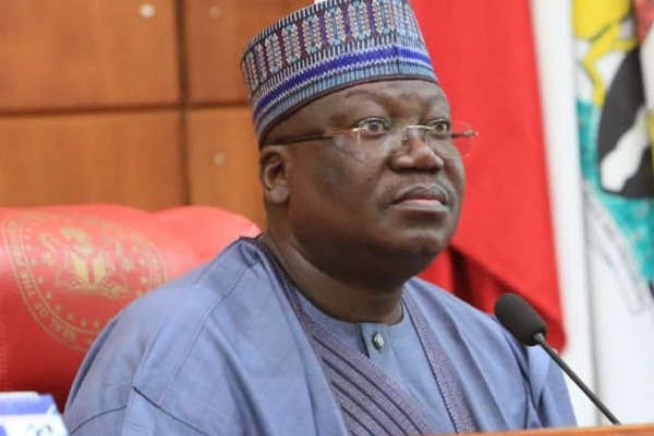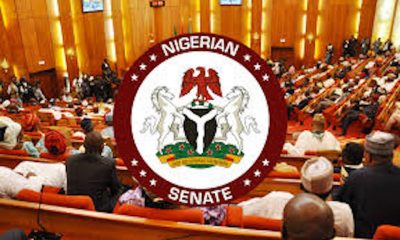Business
2020 finance bill gets special Senate action, passes 1st, 2nd reading

The 2020 finance bill seeking to reduce import levy on buses, tractors and other motor vehicles has passed first and second reading at the Senate.
The proposed law passed first and second reading on Wednesday after the senators gave it a special consideration.
A letter by President Muhammadu Buhari asking the National Assembly to pass the bill was only read on the floors of the House of Representatives and Senate on Tuesday.
Normally, when a bill is read for the first time, a day is fixed to debate the general principles of the legislation after which it will be passed for second reading.
But the Senate Leader, Yahaya Abdullahi, on Wednesday said special consideration should be given to the bill because of its importance to the economy.
He said the legislation was seeking to “provide fiscal relief for taxpayers by reducing the applicable minimum tax rate for two consecutive years of assessment.”
The senate leader said the bill was also seeking to amend the procurement act to implement key procurement reforms previously proposed by the national assembly in 2019.
“The Capital Gains Tax Act is amended at section 36(2) of the CGTA to the extent that exemption on tax liability for compensation for loss of office which was hitherto limited to N10, 000.00 is now extended to N10, 000, 000.00,” he said.
“There is a new section 32 which provides that no tax shall apply to any trade or business transferred to a Nigerian company for the purposes of better organization of that trade or business.
“Section 4 of the Value Added Tax (VAT) act has been amended by increasing the value added tax payable by consumers from 5% to 7.5%. Section 19 increased the penalty payable by a taxable person for non-remittance within the specified period from 5% to 10%.
“Under section 28, the penalty for failure to give notice of change of address or permanent cessation of business was increased from N5,000 to N 50,000 in the first month and N25,000 in subsequent months.
“There is a new section 8 of the VAT Act to cater for the registration of a taxable person upon commencement of business.
“The penalty for failure to register has been increased from N10,000 to N50,000 in the first month and from N 5,000 to N 25, 000 in the subsequent months.”
Yahya also said the bill sought to boost the Small and Medium Enterprises by reducing their tax burden.
However, Ike Ekweremadu, senator representing Enugu west, was opposed to the bill being hurried.
“It is important that we put it to a public test and see what the Nigerian people will say. We must ensure that the people of Nigeria are carried along,” he said.
The bill passed second reading after it was put to a voice vote by Senate President Ahmad Lawan.
Business
CBN permits BDCs to buy up to $25,000 FX weekly from NFEM

CBN permits BDCs to buy up to $25,000 FX weekly from NFEM
The Central Bank of Nigeria (CBN) has granted Bureau de Change (BDC) operators temporary permission to purchase up to $25,000 weekly in foreign exchange (FX) from the Nigerian Foreign Exchange Market (NFEM).
The Central Bank of Nigeria (CBN) has granted Bureau de Change (BDC) operators temporary permission to purchase up to $25,000 weekly in foreign exchange (FX) from the Nigerian Foreign Exchange Market (NFEM).
This move, detailed in a circular dated December 19, 2024, is designed to meet seasonal retail demand for FX during the holiday period.
The circular was signed by T.G. Allu, on behalf of the Acting Director of the Trade and Exchange Department.
The arrangement will be in effect from December 19, 2024, to January 30, 2025.
Under the directive, BDCs may purchase FX from a single Authorized Dealer of their choice, provided they fully fund their accounts before accessing the market.
Transactions to occur at the prevailing NFEM rate
The transactions will occur at the prevailing NFEM rate, and BDCs are required to adhere to a maximum 1% spread when pricing FX for retail end-users.
READ ALSO:
- Badenoch’s negative portrayal of Nigeria Police unfair-PCRC
- Bitcoin price crashes to $95,000 as market continues to react to Federal rate cuts
- Bauchi high court dismisses blasphemy, cybercrime charges against Rhoda Jatau
All transactions conducted under this scheme must be reported to the CBN’s Trade and Exchange Department.
The circular read in part:
“In order to meet expected seasonal demand for foreign exchange, the CBN is allowing a temporary access for all existing BDCs to the NFEM for the purchase of FX from Authorised Dealers, subject to a weekly cap of USD 25,000.00 (Twenty-five thousand dollars only).
This window will be open between December 19, 2024 to January 30, 2025.
“BDC operators can purchase FX under this arrangement from only one Authorized Dealer of their choice and will be required to fully fund their account before accessing the market at the prevailing NFEM rate. All transactions with BDCs should be reported to the Trade and Exchange department, and a maximum spread of 1% is allowed on the pricing offered by BDCs to retail end-users.”
The CBN assured the general public that PTA (Personal Travel Allowance) and BTA (Business Travel Allowance) remain available through banks for legitimate travel and business needs.”
These transactions are to be conducted at “market-determined exchange rates” within the NFEM framework.
This initiative reflects the CBN’s strategy to stabilize the FX market and manage seasonal surges in demand.
CBN permits BDCs to buy up to $25,000 FX weekly from NFEM
Business
Bitcoin price crashes to $95,000

Bitcoin price crashes to $95,000
The cryptocurrency market experienced sharp declines after the United States Federal Reserve announced a 25-basis point rate cut.
Bitcoin’s price dropped from its record high of $108,267 to a multi-day low of $95,000 within 36 hours.
Amid this turmoil, Paper-hand traders are rushing to sell their assets while the experienced ones are taking advantage of the dip to increase their portfolios.
Bitcoin price drops after Federal Reserve announces rate cut
Bitcoin experienced a sharp decline after the Federal Reserve cut interest rates by 25 basis points for the third time this year.
- The announcement led to Bitcoin’s price falling to a multi-day low of $95,000, marking a $13,000 drop within 36 hours.
- This pullback followed a recent record high of $108,268 earlier in the week.
- Federal Reserve Chair Jerome Powell suggested the central bank may halt further rate reductions due to recent Consumer Price Index (CPI) data.
“Today was a closer call, but we decided it was the right move,” Powell said during a press conference. While rate cuts typically benefit cryptocurrencies due to their risky asset status, this decision appears to have introduced caution among buyers.
READ ALSO:
- Bauchi high court dismisses blasphemy, cybercrime charges against Rhoda Jatau
- Suspected notorious kidnap leader arrested in Rivers
- Unsolicited messages: Appeal Court fines MTN N15m
Crypto analysts predict that Bitcoin could face increased volatility in the short term. On-chain data reveals selling pressure has eased since November, but caution remains high. Buyers are closely monitoring Bitcoin’s support levels, particularly around the $100,000 mark, with potential resistance seen at $110,000 in the coming weeks.
Some buyers anticipate a “Santa Rally” a term used to describe the Bullish performance of bitcoin during the Christmas holidays. Historical data on this notion has given mixed outcomes.
In previous halving years, Bitcoin often surged during Christmas week, with price moves of 11% to 25% recorded in 2017, 2020, and 2024.
However, analysts warn that current market conditions, including macroeconomic uncertainty and a cautious Fed, could dampen such expectations.
United States Bitcoin strategic reserve in doubts
Aside from the federal rate cuts announced by Powell. He also mentioned that the Central Bank is not allowed to hold Bitcoin unless approved by Congress.
- This statement cast shadows of doubt on the proposed Bitcoin reserve by Donald Trump during his campaign days.
- The President-Elect last week confirmed that his administration hopes to set up a strategic Bitcoin reserve and pilot the dominance of the US in the Global crypto space.
- The FOMC chairman’s speech about the Central Bank not being able to hold Bitcoin cast doubts on the proposed Goal by the Donald Trump administration.
Bitcoin price crashes to $95,000
Business
Dangote reduces petrol price to ₦899.50/litre

Dangote reduces petrol price to ₦899.50/litre
Dangote Petroleum Refinery has slashed the price of its petrol t to ₦899.50 per litre.
Making this known in a statement on Thursday was Anthony Chiejina, Chief Branding and Communications Officer of the Dangote Group.
He said, “Africa’s first privately-owned oil refinery, which previously lowered the price to N970 per litre on November 24, has now announced a new price of N899.50 per litre. This reduction is designed to ease transport costs during the festive period.”
Adding, Chiejina said, “In addition to the holiday discount, Dangote Petroleum Refinery is allowing consumers to purchase an additional litre of fuel on credit for every litre bought on a cash basis.”
READ ALSO:
- Shekarau-led Northern group seeks amendements to Tinubu’s tax reform bills
- BREAKING: Explosions rock Niger community
- Google issues security warning to 2.5 billion Gmail users
“To alleviate transport costs during this holiday season, Dangote Refinery is offering a holiday discount on PMS. From today, our petrol will be available at N899.50 per litre at our truck loading gantry or SPM. Furthermore, for every litre purchased on a cash basis, consumers will have the opportunity to buy another litre on credit, backed by a bank guarantee from Access Bank, First Bank, or Zenith Bank.”
The statement said the refinery was committed to making sure Nigerians have access to premium quality petroleum products that are competitively priced which are also environmentally and engine friendly.
Dangote reduces petrol price to ₦899.50/litre
-

 metro3 days ago
metro3 days agoMany die at Ibadan children’s Christmas party stampede, organisers arrested (Video)
-

 metro3 days ago
metro3 days agoCourt orders Minister, NIS to pay N3m compensation, issue passport to complainant
-

 metro2 days ago
metro2 days agoFG transfers electricity market regulatory oversight in Lagos to LASERC
-

 metro23 hours ago
metro23 hours agoCourt stops customs from seizing imported rice in open market
-

 metro1 day ago
metro1 day agoAfe Babalola: Court grants Dele Farotimi bail, barred from media interviews
-

 News1 day ago
News1 day agoAdebayo Ogunlesi, 2 other Nigerians make Forbes 50 wealthiest Black Americans list 2024
-

 metro2 days ago
metro2 days agoAbuja demolition: Soldiers attack FCTA officials, seize vehicles
-

 metro1 day ago
metro1 day agoIbadan stampede: Tinubu orders probe as death toll hits 40










You must be logged in to post a comment Login